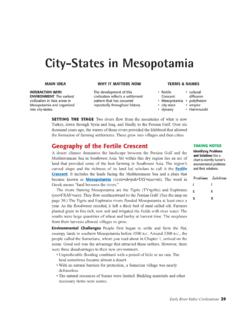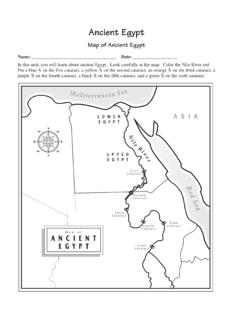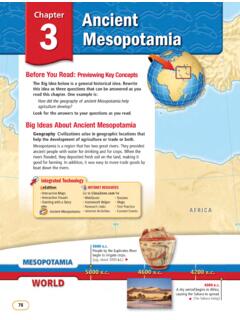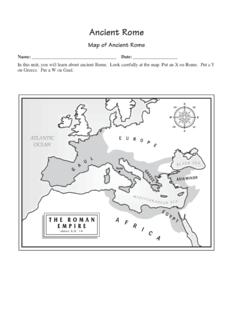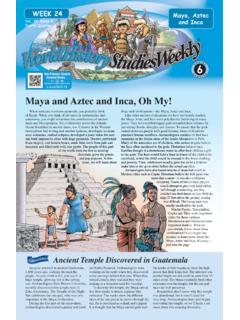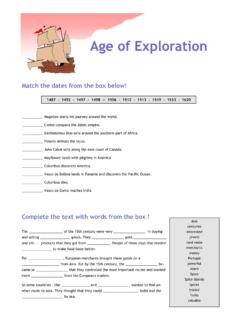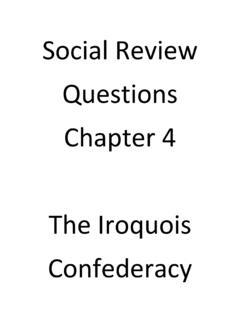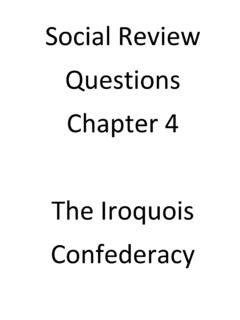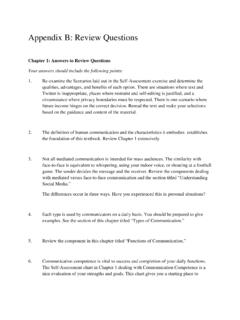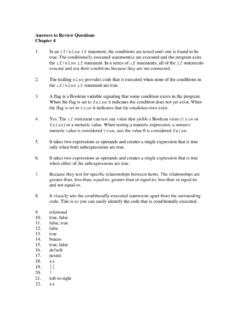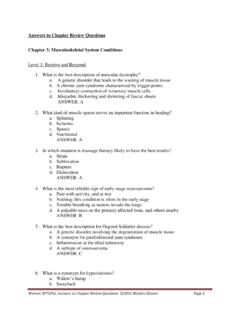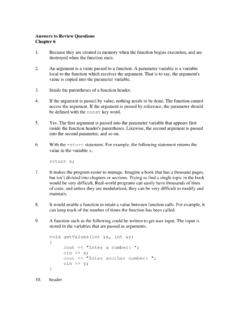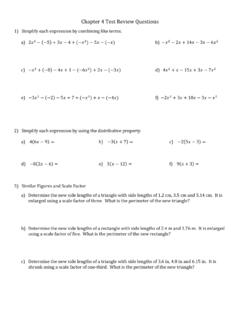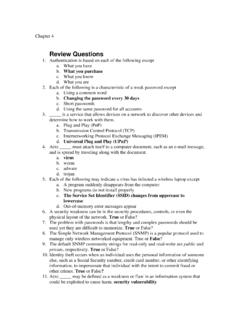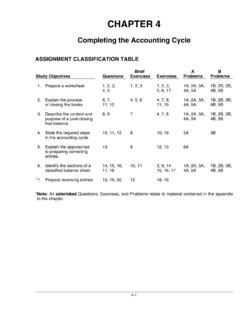Transcription of Chapter 4 Early Empires - 6th Grade Social Studies
1 DeadSeaMediterraneanSeaSyrianDesertCypru sJordanRiver5 EIntegrated Technology Interactive Maps Interactive Visuals Starting with a StoryINTERNET RESOURCES WebQuest Homework Helper Research Links Internet Activities Quizzes Maps Test Practice Current EventsGo to forChapter4 Early EmpiresBefore You Read: Knowledge RatingRecognizing what you already know about each of these terms can help you understand the Chapter : Fertile Crescent tribute tolerationIn your notebook, rate how well you know each term: 3 = I know what this word = I ve seen this word before, but I don t know what it = I ve never seen this word each term in your notebook as you Ideas About Early Empires Government Governments create law codes and political bodies to organize a society. As societies grew, new ways of governing developed to provide people with safety and security. During the Early Empires , leaders developed law codes to bring fair laws to societies. The leaders also set up new ways to organize and rule vast lands with many different groups of builds an empire.
2 1700 River Valley civilization declines. (Harappan seal)1570 New Kingdom in Egypt s Code developed in Babylonian Empire.(statue of Hammurabi) 108 Fertile Crescent,2400 E45 E50 E30 N35 N0050 100 kilometers50100 milesNSEWF ertile CrescentAkkadian Empire c. Empire c. coastlineCity-stateCapital city1027 Dynasty is founded in China. (bronze vessel)750 city-states civilization grows in Mexico. (Zapotec urn)850 Empire reaches its peak. (ivory head)550 Empire is largest in : To build unity in his empire,Hammurabi, the ruler of Babylon, created a set oflaws that applied to all people in the empire. Thelaws covered acts that affected the community,such as business conduct and crime. Imagine thatyou live in a brand-new house in the BabylonianEmpire. Unfortunately, the roof of the house hascaved in. Now, you and your father are talking to thebuilder about who is responsible for the of a typical Mesopotamian house 110110 Starting with a Storyy father pointed to the house and said to the builder, Youcan see the damage.
3 I stood with them in front of our ruinedhouse. The roof of our new house had a huge hole in it. The roofsupports had fallen through the second floor and into the first father turned to me. Stay here, son, he said. He took the builderinside with him. They looked up at the sky from the first could tell that my father was getting angry. The builder seemed notto care. You made mistakes when you built my house, my father toldhim, his voice rising. I paid you the right number of shekels, so you haveto rebuild at your expense. No, the builder snapped. His face lookedmean. I watched his shifty eyes as he snarled, There s nothing that says Ihave to do it. Oh, yes there is! cried my father. The code of laws by KingHammurabi says a builder has to make repairs at his own expense ifa house falls down. Not only that, the law says you have to pay foreverything that was damaged in the house. My father kept talking to the builder. You are lucky no one was homeat the time. If the collapse had killed me, by law you would have been putto death.
4 For the first time, the builder looked a bit worried. If my son, here, had been killed, your son would have had to die. Myfather seemed to be getting somewhere now. The builder looked more builder started to back away from us. Then he started running. Stop! Come back here! my father shouted at him. I turned to my father. Isn t he going to obey the code of law? What do we do next? Why are laws necessary?1. READING: ThemeA theme is the subject or idea that astory is about. Look at the illustration and think about thequestion at the end of the story. Talk with a partner to decidewhat the theme of this story is. As you read other stories inthis book, watch to see if this theme WRITING: PersuasionImagine that you are thefather in this story. Write a persuasive speech listing yourcomplaints about the builder of your house. Then presentyour speech to your IDEASG eography Powerful city-states expanded tocontrol much of Babylon built a large empire inthe Fertile Hammurabi created one of thefirst codes of NOTESR eading Skill: SummarizingSummarizing means restating the main idea andimportant details about a subject.
5 As you readLesson 1, make a summary statement about each ofthe topics listed. Record them on a list of your own. Bust of SargonSargon ofAkkad created the world sfirst empire 4,500 years Handbook, page R3 Topic StatementGeographyA strong kingA law code112 Chapter 4ambitiouseager to gainsuccess, fame, or power(page 113)Many Mesopotamianleaders wereambitious, butfew were as successful asSargon of seriesof events that occurrepeatedly (page 114)The decline, as well asthe creation, of empiresis an important a personchosen to rule overa colony or territory(page 114)Emperors selectedgovernorswho would carry out theemperors group of personsthat are usually alike insome way (page 115)The upperclass of a societyusually has more wealth,resources, and power thando other to KnowUnderstanding the following words will help you read this lesson:Mesopotamian EmpiresBuild on What You Know How big is the state where you live? What kinds of activities take place in the capital of your state?
6 Most of the Mesopotamian city-states were smaller than the state you live in. The city-states were centers of culture and First Empire BuildersESSENTIAL QUESTION Who controlled Mesopotamia?From about 3000 to 2000 , , ambitious kings of the city-states of Sumer fought over land. The land was flat and easy to invade. More land would give more wealth and power to the king. However, no single king was able to control all of the city-states in Builds an Empire About 2350 , a powerful leader named Sargon took control of both northern and southern Mesopotamia. Sargon of Akkad is known as the creator of the first empire in world history. An empireempire brings together many different peoples and lands under the control of one ruler. The person who rules is called an & NAMES empireemperorFertile CrescentHammurabicode of lawjusticeSumerian RuinsDoorways are visible in these ruins of the once important Sumerian city of Uruk. 113 The Akkadian Empire Sargon s empire was called the Akkadian Empire.
7 Eventually, Sargon ruled over lands that stretched in a curve from the Mediterranean Sea through Mesopotamia to the Persian Gulf. This region is called the Fertile CrescentFertile Crescent (see map on page 109). Unlike the dry region around it, the Fertile Crescent had rich soil and water that made the area good for s conquests helped to spread Akkadian ideas and ways of life. One of the most important ideas shared in the empire was the Akkadian system of creation of an empire is a pattern that repeats in history. Empires are important because they change the way people live. They may bring peace to the peoples there. They encourage trade, which makes more goods available. Empires often include people from several cultures. The ideas, technology, and customs of the different peoples may be shared by do Empires change the lives of people who live in them?The Babylonian Empire ESSENTIAL QUESTION Which Empires ruled the Fertile Crescent?The empire of Akkad lasted for about 200 years.
8 It fell apart because of attacks by outside peoples. Fighting also took place among city-states within the Expand About 2000 , people known as the Amorites began to invade and take control of the city-states of Sumer. They chose the city of Babylon, which was located on the Euphrates River, for their capital. From 1792 to 1750 , a powerful Amorite king named HammurabiHammurabi (HAMHAM uh RAH bee) ruled the Babylonian Empire. Hammurabi expanded control over many city-states. Soon, his empire stretched across Mesopotamia and other parts of the Fertile used governors to help him control the lands. He sent out people to collect tax money and appointed judges to help keep order. Hammurabi also watched over agriculture, irrigation, trade, and the construction of did Hammurabi control his huge empire? Statue of Hammurabi This statue from about 1760 shows Hammurabi Chapter 4 DOCUMENT BASED QUESTIONWhat do the laws tell you aboutjustice at the time?Hammurabi s Law CodeESSENTIAL QUESTION Why did Hammurabi create a law code?
9 Hammurabi ruled a vast empire of many peoples with differentideas, ways of life, and sets of laws. He needed a set of rules thatall his people could Code of LawsHammurabi believed acode of lawcode of law wouldhelp to control the empire. A code of law is a set of writtenrules for people to obey. He sent out people to collect theexisting rules. After studying these rules, Hammurabi puttogether a single code of law. The code, written in cuneiform,was displayed on huge pillars near a for AllThe code s goal was to bringjusticejustice, fairtreatment of people, to the people. In addition to identifyingacts of wrongdoing, the code gave rights to people living in theland. Even women and children had rights, which was not thecase in many ancient cultures. Punishments were different foreach Social class. (See Primary Source below.)from Code of HammurabiTranslated by L. W. King195. If a son strike his father, his hands shallbe hewn [cut off].196. If a man put out the eye of another man,his eye shall be put If a man break another man s bone, hisbone shall be If any one strike the body of a manhigher in rank than he, he shall receivesixty blows with an ox-whip in If a freed man strike the body ofanother freed man, he shall pay tenshekels in If the slave of a freed man strike the bodyof a freed man, his ear shall be cut : Hammurabi s Codeis sometimes called the eye foran eye code.
10 It included 282 lawscovering business, property, andconduct toward other people. Thelaws help us understand whatwas important to the people inHammurabi s scene isfrom the uppersection of a pillarwith the law codeof laws werewritten on thelower section sothat people couldsee them. Primary SourceHandbookSee the excerptfrom the Code ofHammurabi, page Empires 115 Hammurabi s Legacy The code established the idea that thegovernment should provide protection and justice for the wanted to replace the belief in personal revenge asa way of solving problems. Hammurabi s Code set out the beliefthat society should be run by the rule of law. That means the lawshould be applied to all people, not just a few. By placing the lawson pillars where they could be seen, it also suggests everyone has aright to know the laws and the punishments for breaking was the purpose of Hammurabi s Code?Lesson Summary Sargon of Akkad built an empire of many differentpeoples under one ruler and one government.

